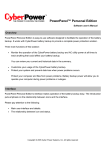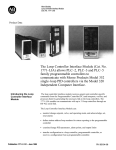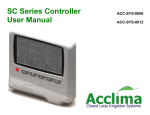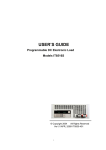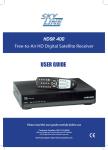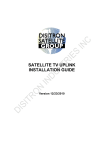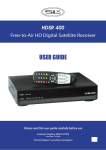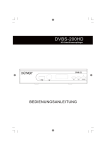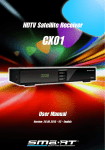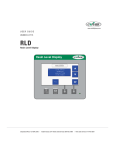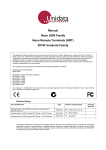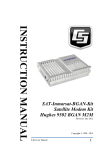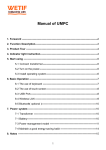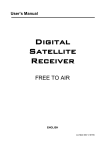Download Digital High Defintion 230/12V Satellite Receiver User Manual
Transcript
Digital High Defintion 230/12V Satellite Receiver User Manual Important Safety Instructions 1. Read these instructions 2. Keep these instructions. 3. Heed all warnings. 4. Follow all instructions. 5. Do not use this apparatus near water. 6. Clean only with dry cloth. 7. Do not install near any heat sources such as radiators, heat registers, stoves, or other apparatus (including amplifiers) that produce heat. 8. Operate this product only from the type of power source indicated on the label. If you are not sure of the type of power connected to your home, consult your local power company. Disconnect the unit from the mains before any maintenance or installation procedure. 9. Protect the mains cord from damage and stress. 10. Only use attachments /accessories specified by the manufacturer. 11. Unplug this apparatus during lightning storms or when unused for long periods of time. 12. Refer all servicing to qualified service personnel. Servicing is required when the apparatus has been damaged in any way, in cluding damage to the mains cord or plug, if the unit has been ex posed to liquid or moisture, has been dropped or is not operating correctly. 13. Do not impede the air flow into the unit by blocking the ventilation slots. 14. Attention should be drawn to the environmental aspects of battery disposal. 15. Use the apparatus in moderate climate. WARNING: To reduce the risk of fire or electric shock, do not expose this apparatus to rain or moisture WARNING: The batteries shall not be exposed to excessive heat such as directsun light, fire, etc. Warning: • The apparatus shall not be exposed to dripping or splashing and that no objects filled with liquids, such as vases, shall be placed on the apparatus. • The MAINS plug or an appliance coupler is used as the disconnect device, the dis connect device shall remain readily operable • The batteries shall not be exposed to excessive heat such as sunshine, fire or the like. This symbol indicates that dangerous voltages constituting a risk of electric shock are present within this unit. This Symbol indicates that there are important operating and maintenance instructions in the literature accompanying this unit. This Symbol indicates that this product incorporates double insulation between hazardous mains voltage and user accessible parts. When servicing use only identical replacement parts. Package Contents Before installation, please check the contents of the package. The package should contain the following items: 1) DVB-S2 Receiver x1 pcs 2) Remote Control x1 pcs 3) AAA Battery for the Remote Control x1 pair 4) User Manual x1 pcs 5) 12/230V Power Adapter x1 pcs 6) 12V mobile Adapter x1 pcs 7) external Infrarot Sensor x1 pcs 8) CVBS Adapterx1 pcs Table of Contents Front and Rear Panel Remote Control System Connection Satellite Setting Channel Scan Basic Operation Program Setting Picture Setting Channel Search Time Setting Option System Setting USB Time shift and Recording Timer EasyFind Troubleshooing Technical Specifications Notice About Recycling Declaration of Conformity 1 2 4 5 7 8 8 9 10 11 11 11 13 14 15 15 23 24 25 25 Front and Rear Panel 1. Front panel 2.Rear panel 1 1. 2. 3. 4. 5. 6. 7. 2 3 4 5 6 7 LNB IN: This socket connects to your satellite antenna. LNB OUT: USB: For Software upgrade and media playback IR Sensor: Used to Receive the signal from Remote Control. HDMI: High definition audio and video output used to connect to a HDMI device. CVBS/L/R: Connector for the analog output with the delivered chinch cable. 12V: Power Connector 1 Remote Control POWER: Switch the receiver in and out of Standbymode. 0-9: Numeric keys. CH-/CH+: Program changing keys. MENU: Display main menu on TV screen, and press again to disappear menu. OK: To confirm current setting, or display channel list in no-menu mode. VOL-/VOL+: To increase / decrease volume. EPG: Shows the Electronic Program Guide FAV: Displays your favorite channel list. Press FAV again to access to the other favorite lists. V-FORMAT: Switch the HDMI resolutions. RECALL: Go back to the previous viewed channel. RED/GREEN/YELLOW/BLUE: Used to navigate between pages in teletext mode and special functions in Menu or EPG. TTX: Switch in Teletext, if current channel has this option, and use EXIT key to quit Teletext SUB-T: Display subtitle options (availability depends on the channel). LANG: Change the Audio Language and Left/Right channel (availability depends on the channel). EXIT: Use this key to quit current menu. INFO: Displays information about the current channel. TV/RADIO: Switch between Digital Radio and Digital TV mode. MUTE: To switch audio output on/off. PAGE+/PAGE-: To navigate inside the menus. ASPECT: Switches Aspect Ration such as 4:3 / 16:9. TIMESHIFT: Use to start Time shift function. TIMER: Use to access ON/OFF Timer directly. PVR: Use to access recorded content in USB drive. GOTO: Go to desired time in multimedia file. 2 REPEAT: Repeat play multimedia file. Installing the Batteries Remove the battery cover from the rear of the Remote Control and place 2xAAA size batteries inside the compartment. Please make sure the battery polarities match the polarity markings inside The compartment. Using the Remote Control To use the Remote Control, point it towards the external IR Sensor of the Digital Set Top Box. The Remote Control has a range of up to 6 metres from the Set Top Box at an Angle of up to 60 degrees. The Remote Control will not operate if its path is blocked. Sunlight or very bright light will decrease the sensitivity of the Remote Control. 3 System connection For a basic connection from your Set Top Box to your television set, you can use the CVBS Adapter. For a higher quality connection use a direct HDMI connection. Connect an audio amplifier you have to use also the CVBS Adapter for L/R Audio. Satellite Setting (1) Preparation: You will have to know the following parameter to make a successful channel Scanning. The satellite orientation. If you have more than one antenna or one antenna with more than one LNB, You will have to know which type of switch (Toneburst od DISEqC) is employs And to which port each Antenna LNB is connected. For a Unicable/SCR EN50494, you will have to know which IF-Channel is Available and its corresponding frequency. Please ask the installer if any of the parameter is not known. 4 Example: A satellite antenna orients satellite ASTRAS 19.2° and has a “universal” or “Digital” LNB. We recommend the pre-programmes list in this case. If you would not like to use the pre-programmed list, the common setup for ASTRA 19.2° is as followed: Satellite: LNB Type: LNB Voltage: 22KHz: Toneburst: DiSEqC 1.0: DiSEqC 2.0: Motor: 019.2E Astra 1H. 09750 / 10600 13/18V AUTO None None None None (2) Process: On the left side of the screen there is a list of satellites which is preProgrammed. Settings of the chosen satellite is displayed on the right side. Process: Select the first satellite to be set up with UP/DOWN. Press the OK button. The chosen satellite is marked with a hook, confirming this satellite will be considered in the coming channel scan Press the button RIGHT to access to the right side. Select the option with UP/DOWN and change the parameter with LEFT/RIGHT. Press Menu after defining all parameters for this satellite to get back to the Left side. If your satellite system can receiver signals from a number of satellites, Select a further satellite with UP/DOWN. Press OK and define the parameter On the right side. Repeat this procedure for all satellites available for your receiver. Notes: After a correct setting, an approximate value of the signal quality will be Shown on the lower part of the menu. If a satellite is missing on the list, press the Red button. A dialogue window will appear, input the value for longitude, east/west and frequency and choose “Blind Scan” in the coming channel san. If you add a satellite to the list, there will be no display of the signal quality for this satellite, in spite of correct setting. Signal quality can only be displayed for satellites saved under the transponder list. Press GOTO to display the transponder of the chosen satellite. Add new Transponder with the RED button and mark the transponder for channel scan With OK. 5 (3) Explanation of the parameters LNB Type: define the oscillator frequency for your LNB. Please take the Correct value from the manual of your LNB (standard: 09750/10600) If you have a Unicable/SCR EN50494, select LNb type Unicable (A or B, A is generally the correct choice by a Unicable system for satellite reception). Choose a free channel (IF channel) and the corresponding frequency. Please refer to the manual of your Unicable system. LNB voltage: This parameter defines the storm voltage of the antenna and the signal from the horizontal or vertical polarized transponder will be received. The setting will only have to be changed in very rare cases. A false setting will result in missing program or no signal reception at all (standard: 13/18V). 22KHz: The receiver can switch the LNB with 22KHz signals for the reception of another frequency band. The setting will only have to be changed in very rare cases. A false setting will result in missing program or no signal reception at all (standard: Auto). Toneburst: Toneburst switcher has two input ports. It enables the connection of 2 antennas or LNB to the receiver. If you have a Tone burst switcher, you will have to select one of the both connections (A or B) for the satellite chosen on the left side. DiSEqC: DiSEqC switcher has up to 16 input ports. It enables the connection of multiple antennas or LNB to the receiver. If you have a DiSEqC switcher, you will have to select one of the connections of the satellite chosen on the left side. Please check which version (1.0, 1.1) can be supported in the manual of your switcher. Motor: Rotatable antennas require extended configurations. We recommend Professional installation from a technician. Please set up according to your Antenna. You can open further set up windows with the RED and the GREEN Button After the set up has been done for all reachable satellites, please press the BLUE button to open the menu for channel scan. 6 Channel Scan There appears a window showing “channel search” upon pressing the BLUE Button on the menu of the satellite setting. In this window you can make Three entries to affect the can result. Scan mode: Default: The receiver scans channels according to a pre-programmed list. This search process goes fast without being able to find programs on new Transponders Blind search: The receiver scans every possible frequency. It takes a little bit more time than the default scan. However, it is possible to find programs from unknown transponders. Network: The receiver scans channels according to a pre-programmed list. The frequency of a new transponder could be found out through analysis of the known transponders. The scan process is shorter than the “blind scan” but There might be possible missing programs. Please select “blind scan”. It takes a little bit longer but will result in a Complete program list. If you can have added a new satellite on the menu of Satellite setting, please select “blind scan”, for there is no transponder list available for the newly added satellite. There is no “blind scan” option in case of an Unicable system. Press the OK button to start the channel scan. After the channel scan is completed, a live picture of the first found channel will be shown on the screen. 7 Basic Operation (1). Program Manage settings To access the menu press the MENU button and select [program]. Using the LEFT/RIGHT keys to navigate through the menu. The menu provides options to adjust the Program Manage Settings. Select an option and press Ok or RIGHT to adjust that setting. Press the EXIT button to exit the menu. (a) Program Edit To edit your program preferences (lock, skip, favorite, move or delete), you will need to enter the Program Edit Menu. This menu requires a password to access. Enter the default password `000000´. The master unlock password is `888888´. (b) EPG (electronic Program Guide) The EPG is an on-screen TV guide that shows scheduled programs seven days in advance for every tuned channel. Press the EPG button on the remote control to access the guide. You can use the UP/DOWN key to select the preferred program. If there is more than one page information use the BLUE button for page up and the YELLOW button for page down. You can select another channels´s EPG by LEFT/RIGHT buttons, view details of each EPG event by INFO button or schedule a recording by OK button. (Please see page 16 of this manual for details in recording option) 8 (c) Sort Sort your channels from the following options: -Default -Encrypt -Freq -Service name (2). Picture Setting To access the menu press MENU then select [Picture] using the RIGHT/LEFT key. The menu provides options to adjust the video settings. Press UP/DOWN to select an option and press RIGHT/LEFT to adjust the setting. Press EXIT to exit the menu. (a) Aspect Ratio This setting defines the picture format of your TV and how the content with Different Aspect Ratio can be adapted for your TV. (b) Resolution You can change the setting if the picture resolution doe not appear to be Correct. This setting is to match the most common setting for HDMI. [480i/480p]: for NTSC TV system. [576i/576p]: for PAL TV system [720p/1080i/1080p]: for NTSC or PAL TV system. (c) TV Format If the picture does not appear to be correct you an change this setting. This should match the most common setting for TVs in your country. [NTSC]: for NTSC system TV. [PAL]: for PAL system TV. 9 (3). Channel Search To access the menu press MENU and select channel search using the LEFT/RIGHT keys. (a) Dish Setup After setup satellite dish, you can search the DTV channels. Select Dish Setup and press OK to start the Dish Setup Menu. Scan a Satellite 1. Select the desired satellite in the satellite list and press the BLUE key to start a Channel Search Menu. You can also add a new satellite by pressing the RED key. 2. Select Scan Mode in Channel Search Menu. 3. Press the OK key to start the channel search. Scan a Transponder You can also scan a desired transponder. Select the satellite first and then press the GOTO key to show the transponder list, select the desired transponder and press the BLUE key to start the transponder scan. Please see page 5-8 of this manual for more details. (b) DB Management With this option you can save the channel list on a USB (export) or load the Channel list from the USB storage (import). 10 (4). Time Setting (a) Time Offset Select auto or manual for GMT offset adjustments. (b) Time Zone Select the Time Zone offset when Time Offset is set to manual. (c) Date Set current date when Time Offset is set to manual. (d) Time Set current time when Time Offset is set to manual. (e) Auto Standby Set auto Standby time. The unit will enter standby mode after the selected time without user interaction. (such as press remote control). (5). Option To access the menu press MENU and select [optional] using the RIGHT/LEFT Keys. The menu provides options to adjust the OSD Language, Subtitle Language and Audio Language. Select an option and press RIGHT/LEFT to adjust the setting. Press EXIT to exit the menu. (a) OSD (On Screen Display) Language Select an OSD Language. (b) Subtitle Language Select the preferred subtitle language 11 (c) Audio Language Select the preferred audio language for watching TV channels. If the language is not available the default program language will be used. (d) Digital Audio If no sound is coming from the audio amplifier which is connected to the coaxial cable You can change this setting. (6). System Setting (a) Parental Guidance Set the age for the parental control. (b) Set Password Set or change the password for locked programs. Enter your old password or the default password `000000´. You will then be asked to enter your new password. Press the Ok button to confirm your new password. Once it is confirmed press EXIT to exit the menu. The master unlock password is`888888´. (c) Restore Factory Default You can cancel all settings and restore the factory default setting. Note: All settings will be deleted. You will have to search the channel list once more. (d) Information Display information of model, SW and HM version. (e) Recall list You can change the function of the Recall button. If it is set “off” the Receiver displays the last program upon pressing the Recall button. If it is Set “on”, a list of programs seen at last will be displayed upon pressing Recall. (f) Software Update) Used for software update. 12 (7.) USB To access the menu press the MENU button and select [USB] using the RIGHT/LEFT keys. The menu provides options to playback Music, Photo and Multimedia files. It can support AVI, MP3, WMA, JPEG and BMP formats. (a) Multimedia: When a USB device is attached you can select from the Music, Photo, Movie or PVR options in this menu using the RIGHT/LEFT keys and OK to Select. If a USB device is not connected, the warning message “No USB device Is Found” will appear. (b) Photo configuration: -Slide Time: adjust slide show interval to 1~8 seconds. -Slide mode: adjust slide show effect as mode 0~59 or random. -Aspect Ratio: [Keep]: Play picture in its original aspect. [Discard]: Play picture in full screen mode. (c) Movie Configuration: -Subtitle Specific: Select the subtitle size. Available settings are Small, Normal and Big.. -Subtitle BG: Select the subtitle background colour. Available settings are transparent, gray, yellow, green and white. - Subtitle Font Color: Select the subtitle font color. Available settings are white, black, red, blue and green. (d) USB PVR Configuration: -Recording Device: Displays information of the connected USB storage device. -Format: Formats of the connected USB device. (ATTENTION: IT WILL DELETE ALL FILES!) 13 Time shift and Recording Time shift Press [Time shift/Pause] key first then at any time you can press the [Play] key and the unit will start playing recorded programs from the start. Press [GOTO] to select the playing time. The Play time cannot exceed the current time. Press [Fast forward]/ [Fast back] to move through the current recording. Note: Time shifting is only available when USB HDD is connected to the system and read/write speed is high enough to support that. Press [Stop] key the first time to end the playing mode. The unit will keep recording but will return to current time. If you press [Pause] the playback will start again from the beginning of the recording. Press [Stop] key again to stop the recording. Recording Press [REC] key. The current program can then be recorded to the USB disc. Press [REC] repeatedly to choose the recording time. Press [INFO] key to see the recording information during the recording as below: 14 Timer The most unique feature of the STB is its ability to record live TV. There are two ways You can do this. The first is to simply connect a USB storage device to your STB And press the record button on the remote. The other way is to schedule a program to record using the blue button or from within the EPG menu. To schedule a recording follow the following steps: Press the blue button on the remote. Press the red button to add a schedule. Adjust the settings according to the schedule of the event. (Start-End time, record/view, etc) Press OK button Press EXIT button. You will be able to select from the following two options: Mode: View or Record If at anytime you wish to delete a scheduled event you can press the blue button to view the list of scheduled events. Use the arrow keys on the remote to highlight the Event you wish to delete then press the blue button to delete it. The recording files can be deleted on this unit. You can go to the PVR and press the yellow button to delete it. The TV program is recorded to file at.mts format which can be played back on this unit and PC using a suitable player, but cannot be played back on DVD or PDVD. For recording high definition TV programs, the version (and speed) of the USB device should Be 2.0 or above, otherwise the unit may not record the HD programs correctly. When recording to a USB stick or external Harddisc on this model, you have to wait a few seconds before pushing rec. after inserting the media. Otherwise the unit can freeze in the signal. If that happens, then please take off the power and connect again to fix this. Note: We cannot guarantee compatibility (operation and/or bus power) with all USB mass storage devices and assume no responsibility for any loss of data that may occur when connected to this unit. With large amounts of data, it may take longer for the system to read the contents of a USB device. Some USB devices may not be properly recognised. Even when they are in supported format, some files may not play or Display depending on the content. Please use external AC-DC power adapter if the current consumption of the USB device is larger than 500mA. 15 Easy Find LNB in connection For the first time, the Easy Find LNB enables the orientation of a satellite antenna without the help of a second person or direct view on the TV set. Also, this LNB replaces orientation aids such as Sat-Finder or other expensive measuring instruments. The Easy Find LNB is not included in the scope of supply of the digital satellite receiver. 16 Connection and rough direction of the antenna You must connect the antenna cable to the LNB before directing the antenna. Please follow also the instructions in the operating manual of your satellite antenna. Caution! The receiver should only be connected to the power supply after you have connected the antenna cable to the receiver. If you have not mounted and directed your satellite system yet, you must first find a suitable location for mounting the antenna. Please make sure that the antenna is directed correctly (to the south). Further information on the exact position of your specific satellite can be found on www.dishpointer.com. This means, you must have a free view in southern direction when you stand behind the antenna. Keep in mind that the antenna must never be mounted behind a balustrade, a handrail or other obstacles (such as trees). Please make sure to mount the LNB correctly. The following drawing will help you: of the sun When searching the southern direction, the position might help you. During summer time, the sun is exactly in southern position at 12 am noon and during winter at 1 pm. 17 South East You must have this view when standing behind the antenna. In this angle of 90° nearly all common satellite positions, such as ASTRA1 19.2° E, Eutelsat Hotbird 13° E, and Türksat 42° E, can be found. Depending on which satellite you wish to receive, there must be free sight without any obstacles in this angle. This must especially be ensured with an installation on a wall. Make sure that you can turn your antenna completely without having contact with the wall of your house before installing a corresponding wall bracket (not necessarily included in the scope of supply). Please note also that the antenna should be mounted in an angle of 90° to the wall. After having made all relevant connections you can now start with the setup of the antenna. Please check again that the receiver is connected with the Easy Find LNB at the antenna and the receiver with your TV set. As soon as these cable connections have been made correctly, you can switch on the devices. First step Switch on your TV set. Please make sure that your TV set has been adjusted to the receiver. In case of a Scart connection, the TV set must be set to the correct AV channel. In case of HDMI connections, the TV set must be switched over to HDMI. Second step Switch on the receiver. As the antenna has not been directed yet, the Receiver will show no Signal Message. 18 Third step Now, you can begin to make the correct settings for your receiver so that then you will be able to direct the antenna with the Easy Find LNB. Please proceed as follows: Press the OK key of the remote control of your receiver. Now you should see the following image on your TV screen. Fourth step Press the GoTo key of the remote control of your receiver once. Now, the Easy Find LNB list appears: From this menu, select the satellite you wish to find with the CH▲ or CH▼ keys. The corresponding satellite must be marked grey. If this is the case, press the „OK“ key to confirm your selection. 19 Fifth step Now you see the following image on your TV screen: Now, press the INFO key of the remote control of your receiver twice. The following will be displayed: Press the red function key to enable the Easy Find function. Now, you can go to your antenna to direct it. You will note that the LED on your Easy Find LNB has begun to flash. This means, it is active. Now, the antenna can be directed to the selected satellite. Sixth step Now, begin with the direction of your antenna. Please proceed as follows: Stand behind the antenna and move the antenna completely into vertical position (see picture B). Make sure that the receiving component of the antenna (Easy Find LNB) is directed towards the south (see picture A). a) Now, turn your antenna slowly to the East (left) or to the West (right) while observing the still flashing LED diode of your Easy Find LNB, depending on where your selected satellite is located. 20 b) If you are approaching a satellite, the LED diode begins to flash faster with red light. With increasing signal strength, the colour changes to orange and the LED diode does not flash anymore. Please note that your antenna is also able to receive other satellites. Also with other satellites it is possible that the LED diode changes to orange, with or without flashing. If you have found the correct satellite - the one you have selected - it must be possible to direct the antenna in such a way that the LED diode changes to green without flashing. This can only be the case with the satellite you have selected from the menu of the receiver. Should it be impossible, move your antenna in such a way that it is 1° flatter. For this purpose, pull at the top of the antenna towards your position. A scale of vertical elevation angles can help you in this process: Now, return the antenna slowly to its initial position towards the south. Then, adjust the antenna once again so that it is 1° flatter (pull it towards your position) and move it again to the left in eastern direction. Repeat these steps until the vertical elevation angle crosses the horizontal azimuth angle, e.g. for ASTRA1 at 19.2° East, and the LED diode on your Easy Find LNB shows a green light without flashing. In case of digital satellite reception, the receiver receives the transmission signal with a time lag. Therefore, turn the antenna very slowly and step by step. 21 Seventh step As soon as you have found the selected satellite, you will see the programme list of the set satellite on the screen, and also the sound will be transmitted. The installation via the Easy Find LNB is done now. The current channel will be displayed. The Easy Find function is deselected by pressing the red function key. Signal strength and quality are displayed again. Now, optimise the antenna direction until you have reached the maximum value on the signal-quality bar. The value may vary according to the situation, weather and signal strength. However, you should reach a minimum of 60%. Exit the menu now by pressing the “EXIT“ key of your remote control. Eighth step Please check once again if you are receiving the programme selected on the receiver. Press the OK key of the remote control and then the 1 key. You will see the general channel list „All satellites“. Now, check also if you can receive further channels of the set satellite. The installation process is complete. 22 Troubleshooting Problem No power Potential Reasons What to do Power isn´t connected Connect the power The power switch is not onSwitch on the power Dish direction not correct. Realign the dish. Please use a bigger No DTV signal Signal is too weak. dish. Retry scan DTV No search program. program. no sound from no or incorrect connection Connect the audio cable the speakers with audio cable. correctly. Turn off the mute Sound on mute. function. Resoulution not supported Press V-FORMAT button by TV set. to change resolution. Only sound, No or incorrect connection Make sure cables are no image on the with AV cable. connected correctly. Press <TV/RADIO> key screen The program is a radio to program. shift into TV mode. The battery is exhausted. Change battery. Remote Control Remote Control is not Adjust the position of the Remote Control and is not responding facing or close enough move to the Set Top Box. closer to the unit. Picture is breaking the signal is too weak. check aerial cable and up connectins. 23 Technical Specifications Item Sub Item Parameter Input Frequency 950 - 2150MHz Tuner Impedance 75 Ohm Symbol rate 2 - 45Mbps Modulation QPSK 8PSK Decoder Format MPEG4AVC/H.264 HP@L4 Video Output Format [email protected] 480i/480p/576i/576p/720p/1080i /1080p Output Port Audio Decoder Format HDMI, SCART MPEG-1 (layer1&2&3), WMA, AC3 Audio Output Coaxial, L/R (SCART) USB 2.0 Supported Capacity Supported Media Supply Voltage ~100-240V 50/60Hz Maximum Power Consumption <25W Standby Power Consumption <1W Weight 05.kg Size 168 x 95 x 38 mm Power 24 500 GB MP3, WMA, JPEG, BMP, AVI, MKV Notice about recycling Your product is designed and manufactured with high quality materials and components which can be Recycled and reused. This symbol means that electrical equipment, at heir end-of-life, should be disposed of separately from your household waste. Please dispose of this equipment at your local community waste collection/ recycling centre. In the European Union there are separate collection systems for used electrical and electronic products. Please help us to conserve the environment we live in! Declaration of Conformity This product complies with the requirements of the following directives: Electromagnetic Compatibility (EMC) Directive: 2007/108/EC Low Voltage Directive (LVD): 2006/96/EC CE Marking Directive: 93/68/EEC Energy Using Products Directive: 2005/32/EC The above Directives declare that the DVB-T Set Top Box B1602 is in Compliance with following standards: EN55013:2001+A1:2003+A2:2006 EN61000-3-2:2006 EN61000-3-3:1995+A1:2001+A2:2005 EN55020:2007 EN60065:2002+A1:2006 ISO/IEC 17025 COMMISSION REGULATION (EC) No 107/2009 25































